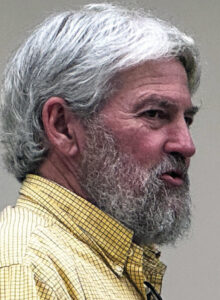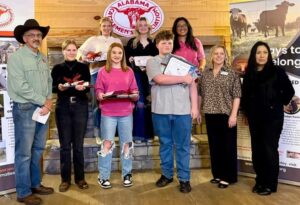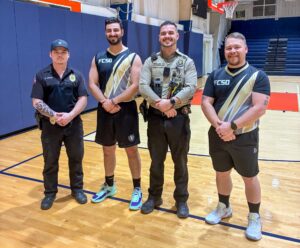ID legislation sparks war of words
By Staff
John Hicks FCT Staff Writer
Although an Alabama cow recently tested positive for mad cow disease and had to be killed, government and industry officials said the isolated incident poses no threat to people or animals.
State Agriculture Commissioner Ron Sparks and other authorities said the U.S. Department of Agriculture's program for handling such matters was sound.
That didn't stop gubernatorial candidate Roy Moore from criticizing new animal ID legislation endorsed by Sparks.
In speeches and interviews, Moore has equated the legislation with communism and insinuated that the recent report of a BSE-infected cow in Alabama was untruthful.
"It's a strange coincidence that the first case of mad cow disease came up at the same time the Senate was considering implementation of the National Animal Identification System," Moore said.
Moore's criticism ignited a war of words between the former Alabama chief justice and the agriculture commissioner.
The legislation, which would allow the state agriculture department to implement an animal identification system consistent with any system developed by the U.S. Department of Agriculture, stalled in the Senate after flying through the Alabama House.
"Over the past few days, I have become very concerned by some of the confusion about animal ID registration that has come as a result of Mr. Moore's comments from last week," said Sparks in a press release.
"Ever since I took office, one of my main concerns has been to protect consumers and farmers by taking a proactive approach. It is obvious that Mr. Moore does not understand BSE or any other animal disease."
Gov. Bob Riley weighed in, accusing Moore of politicizing the issue.
"As long as I'm governor I'm going to do everything I can to protect all livestock in Alabama. Too many lives depend on it," Riley said. "Something like mad cow disease is not something we need to politicize."
Franklin County beef producer and Alabama Cattlemen's Association Vice President Orland Britnell agreed with Sparks that the livestock identification plan will keep Alabama-produced beef safe for consumers and protect the interests of farmers.
"A unique number called a Premise ID Number is being assigned to every location where animals are born, managed, marketed, or exhibited," said Britnell. "This is an inexpensive and user-friendly way for producers and consumers to keep track of livestock."
Veterinary clinics that hold livestock in their facilities will also be assigned a Premise ID Number. The number of each location the animal passes through will be recorded on a scannable ear tag.
A group of approximately 100 animal and livestock industry professionals representing more than 70 associations, organizations, and government agencies developed the identification plan.
"Officials will soon be able to backtrace any animal within 48 hours," said Britnell. "Wherever the cow goes, it can be traced back to the farm of origin."
Britnell urged beef producers to obtain a premise number.
"Consumers are the ones demanding a comprehensive livestock identification system," said Britnell. "Obtaining a premise ID is the first step a producer must take."
Mad cow disease is the common name for bovine spongiform encephalopathy, or BSE. BSE in cattle was first reported in 1986 in the United Kingdom.
It is now commonly accepted that prions are the cause of BSE. A prion is a unique type of infectious agent made entirely of protein.
The exact origins of BSE remain uncertain, but it is thought that cattle initially may have become infected when fed feed contaminated with scrapie-infected sheep meat and bone meal. Scrapie is a prion disease in sheep similar to BSE in cattle.
In the U.S., mad cow has been transmitted through feed containing meat and bone meal derived from infected cattle. This type of protein supplement has been prohibited in the U.S. since 1997. Mad cow cannot be transmitted from mother to calf, or from cow to cow via airborne transmission. As a contagion, it is readily contained when identified, according to experts.
Since the mid-1980s, cattle producers have been paying "check-off" costs, a federal fee that helps pay for research and promotion. Since the creation of the Beef Check-Off Program, U.S. cattle producers have been charged a mandatory federal one-dollar-per-head fee every time cattle are sold in the United States.
In Alabama, beef producers pay an additional self-assessed fee of 50 cents on each head of cattle.
"This fee complements the national check-off, with the majority of the proceeds going to the cattlemen's association," said Britnell. "These funds are used to promote beef through media campaigns and safeguard against BSE."
The check-off programs work, according to Britnell. Even with mad cow in the news, America's appetite for beef is increasing.
"Demand for beef is up 24 percent over the last six years," said Britnell, adding that continuing improvements in livestock identification and testing will also help increase consumer confidence in beef. "America has the safest and most plentiful food supply in the world."
Sparks said that mad cow is only one of many reasons animal ID is crucial, citing the existence of highly-contagious diseases like foot and mouth and avian flue that could have an impact on Alabama agriculture.
"The purpose of animal ID is to track a diseased or exposed animal efficiently to ensure a rapid control and recovery program," said Sparks. "This in turn protects both animals and humans from potential health risks, while ensuring a safe, wholesome, and economical food supply."
For more information on Alabama's beef industry, visit www.bamabeef.org.







